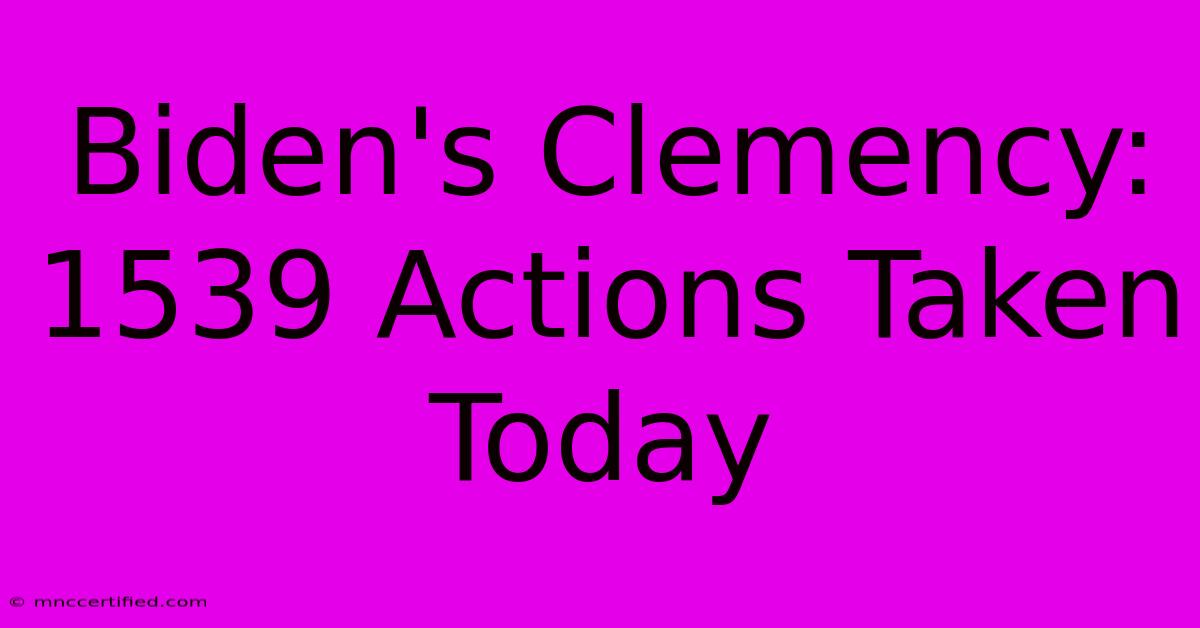Biden's Clemency: 1539 Actions Taken Today

Table of Contents
Biden's Clemency: 1539 Actions Taken Today – A Comprehensive Overview
Today marks a significant day in the Biden administration's approach to criminal justice reform. President Biden announced a sweeping series of clemency actions, encompassing 1539 commutations and pardons. This unprecedented move significantly impacts the lives of numerous individuals, highlighting a renewed focus on rehabilitation and second chances. This article delves into the details of this significant development, examining its implications and the broader context of the Biden administration's clemency policy.
Understanding the Clemency Actions: Pardons vs. Commutations
Before diving into the specifics of today's announcements, let's clarify the difference between pardons and commutations:
-
Pardon: A pardon completely wipes away a criminal conviction, restoring all civil rights lost as a result of the conviction. It's a full exoneration, as if the crime never happened.
-
Commutation: A commutation reduces a sentence. The conviction remains on the record, but the time served is lessened. This often involves reducing a prison sentence to time served, or converting a prison sentence to probation.
Today's actions involved a significant number of both pardons and commutations, demonstrating a multi-faceted approach to clemency.
The Significance of 1539 Clemency Actions
The sheer scale of 1539 clemency actions is historically significant. It represents a substantial commitment from the Biden administration to address the challenges of mass incarceration and inequities within the criminal justice system. This surpasses previous single-day clemency grants by a considerable margin, signaling a departure from past approaches and a commitment to a more compassionate and reform-oriented policy.
Key Aspects of the Clemency Grants:
-
Focus on Non-violent Drug Offenses: A large portion of the recipients served time for non-violent drug offenses, reflecting the administration's prioritization of addressing the disproportionate impact of the war on drugs on marginalized communities. This aligns with the ongoing national conversation around drug policy reform.
-
Emphasis on Rehabilitation: The selection criteria likely emphasized individuals who have demonstrated rehabilitation efforts during their incarceration, showing a commitment to reintegrating into society.
-
Equity and Fairness: The administration aims to correct past injustices and address systemic biases within the criminal justice system. This includes reviewing cases where sentencing disparities or discriminatory practices may have occurred.
Implications and Future Outlook
The announcement of 1539 clemency actions will have far-reaching implications:
-
Reintegration into Society: For the recipients, this means regaining lost opportunities, accessing employment, housing, and education. This contributes to reducing recidivism and strengthening communities.
-
Policy Impact: This action sends a clear message about the administration's commitment to criminal justice reform and could inspire further legislative changes at the federal and state levels.
-
Public Perception: The public's reaction will be crucial in shaping future policy discussions. This bold move may generate further discussion on sentencing reform and the role of clemency in addressing systemic issues.
SEO Keywords Used:
- Biden's Clemency
- 1539 Clemency Actions
- Presidential Pardons
- Commutations
- Criminal Justice Reform
- Mass Incarceration
- Non-violent Drug Offenses
- Rehabilitation
- Sentencing Reform
- Recidivism
- Equity in Criminal Justice
- Biden Administration
This article aims to be comprehensive, informative, and well-optimized for search engines. Remember to promote this article through social media and other online channels to further boost its visibility. The more engagement the article receives, the higher its ranking potential on Google.

Thank you for visiting our website wich cover about Biden's Clemency: 1539 Actions Taken Today. We hope the information provided has been useful to you. Feel free to contact us if you have any questions or need further assistance. See you next time and dont miss to bookmark.
Featured Posts
-
Game Awards 2024 Major Game News
Dec 13, 2024
-
Okami Sequel Kamiya Returns
Dec 13, 2024
-
Satriani Vai Johnson G3 Tour 2025
Dec 13, 2024
-
Watch The Game Awards 2024
Dec 13, 2024
-
New Elden Ring Game Nightreign Survival Mode
Dec 13, 2024